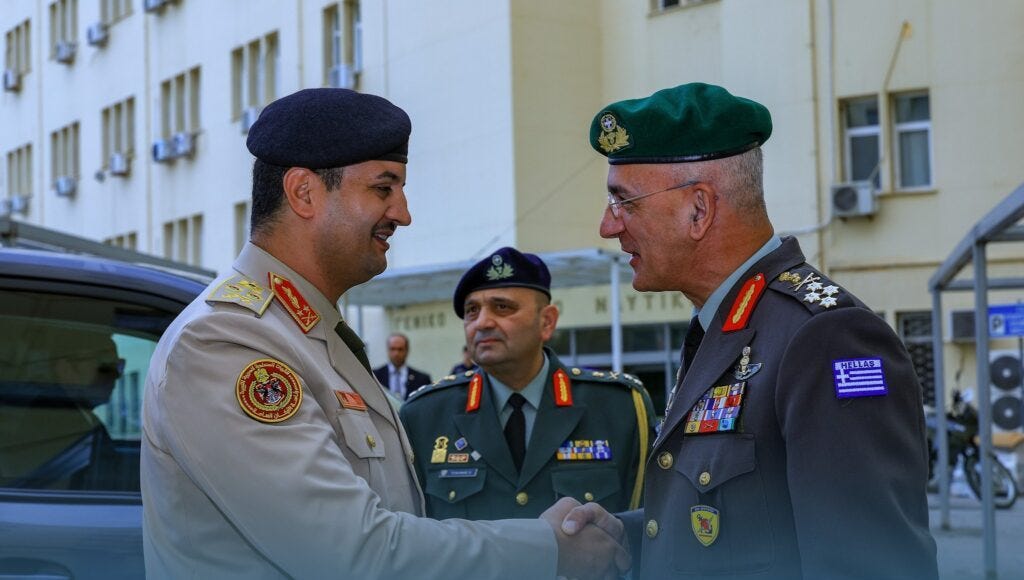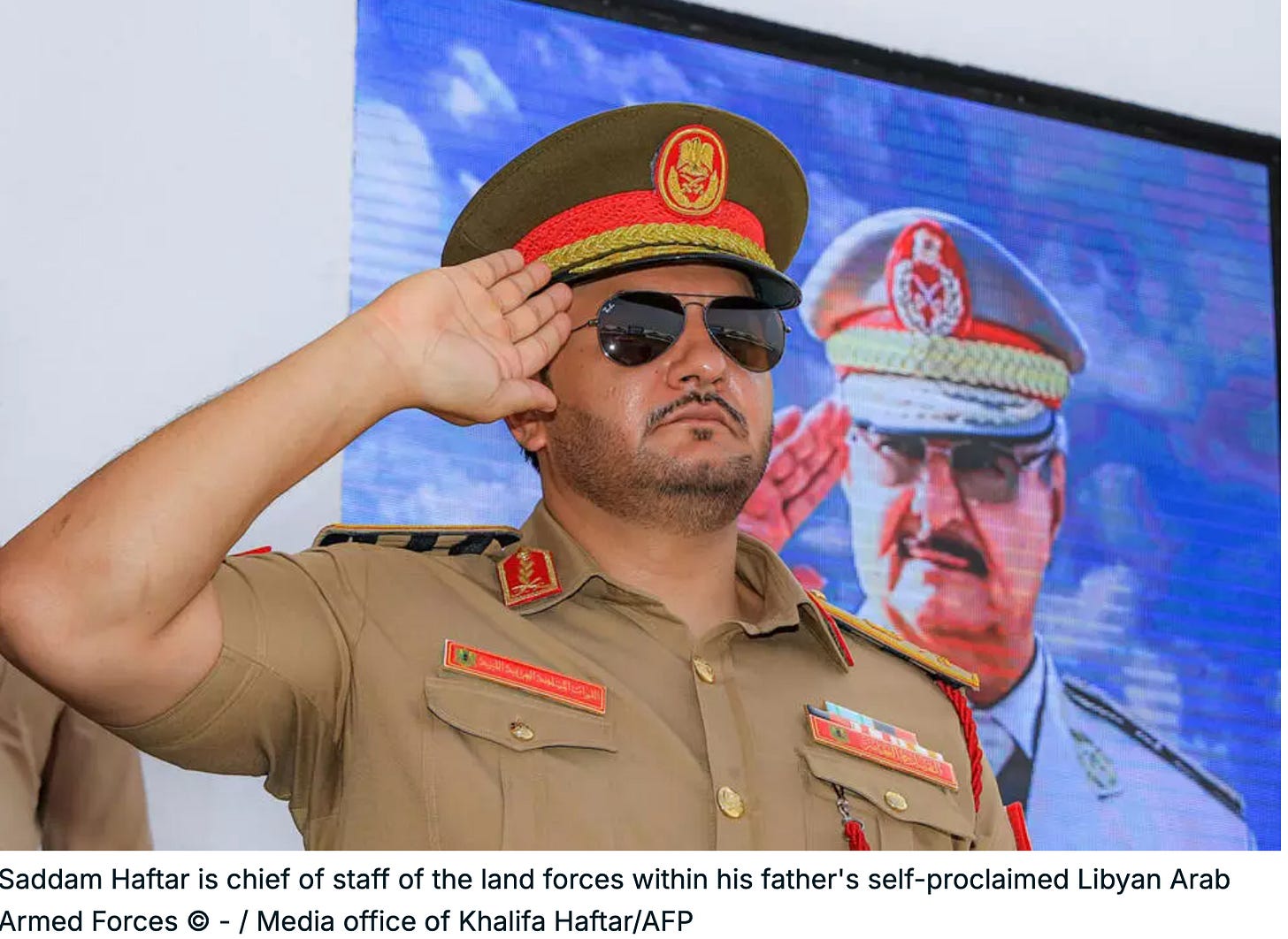By Dario Cristiani
The recent official visit to Athens by the Chief of Staff of the Libyan Armed Forces, Lieutenant General Khaled Haftar, demonstrates how Libya remains at the center of key geopolitical and diplomatic dynamics in the Mediterranean. Arriving on October 22, the son of Marshal Khalifa Haftar — the strongman of eastern Libya — met with the Greek Minister of Defense, Nikos Dendias, and the Chief of the Hellenic National Defense General Staff, Dimitrios Choupis. The stated goal was to strengthen military cooperation and regional security.
At the heart of the discussions was the intent to institutionalize a strategic collaboration between the Greek armed forces and the Libyan National Army (LNA), with a particular focus — as usual — on border control, maritime security, and military training. In recent months, Athens has trained about fifty Libyan soldiers at the Naval Deterrence Center in Chania, Crete, as part of European Union (EU)-supported coastal security programs. Khaled Haftar’s visit aims to solidify this path and is part of a broader strategy of “active military diplomacy” being pursued by the Cyrenaica bloc – which is the non-recognized Eastern government led by Osama Haddad, the House of Representatives (HoR) and the Libyan National Army (also known as the Libyan Arab Armed Forces).
Clan Haftar and the Struggle for Eastern Libya
Haftar’s militia acts as a formal national army, which remains the dominant force in eastern Libya. During the past ten years, all these actors have tried to maintain relations with different external powers as part of an effort to obtain greater legitimacy and influence in Libyan politics, even without being an officially recognized government. The visit by Khaled Haftar also follows that of another of Marshal Haftar’s sons, Belgassim Haftar. Belgassim is one of his elder sons who has been an economic and business advisor to his father for years, who arrived in Athens a few weeks earlier to discuss reconstruction projects and economic cooperation.
Several motivations drive Greek engagement with Haftar. First, beyond maintaining strong ties with Cyrenaica and Haftar’s controlling forces, his regime’s lack of international recognition compels him to seek greater legitimacy abroad. Second, Athens seeks to sustain an operational security partnership in the central Mediterranean.
Geopolitically, developments in Benghazi and the surrounding areas are far more significant to Greece than those in western Libya. Athens also seeks to maintain a privileged channel with eastern Libya, primarily to ensure that if the political crisis evolves and eastern forces become part of a recognized government, Greece can capitalize on the relationships it has built with Haftar over the past decade. The core issue for Greece, however, remains unchanged: sustaining this relationship is crucial within the context of its regional rivalry with Türkiye—especially as Ankara continues to strengthen its ties with Haftar’s forces in the east (please see my article in Eurasia Outlook on this topic).
Moreover, the timing of Khaled Haftar’s mission coincides with a new round of talks between Greece and Türkiye recently held in Izmir, which focused on creating more confidence-building measures between the two countries and further reconfirms the link between the Libyan dossier and Turkish-Greek relations. Athens and Ankara are both seeking to stabilize their bilateral relations after years of tension, and the Libyan issue — particularly the maritime MoU signed between Tripoli and Ankara in 2019 — remains one of the most sensitive arenas, where Greek and Turkish ambitions continue to clash.
In this context, Prime Minister Kyriakos Mitsotakis has also proposed an ambitious initiative in the Greek parliament: an Eastern Mediterranean Forum that would bring together Greece, Libya, Egypt, Türkiye, and Cyprus to jointly address issues such as the delimitation of maritime zones, migration management, environmental protection, and regional connectivity. The initiative seeks to establish a stable multilateral framework for dialogue and cooperation, capable of easing tensions and promoting stability in the Eastern Mediterranean.
Greece has intensified its diplomacy in the Eastern Mediterranean in recent months, reaffirming the centrality of the delimitation of Exclusive Economic Zones (EEZs) as a cornerstone of its foreign and security policy. Athens aims to solidify its role as a normative and maritime power, using international law — particularly the UN Convention on the Law of the Sea (UNCLOS) — as a tool for legitimacy and geopolitical projection. It is worthwhile to mention that neither the United States nor Türkiye recognize UNCLOS.
Greece’s EEZ Strategy
Greece’s main objective is twofold: on one hand, to defend the full legal entitlements of its islands — including Crete, Rhodes, and Kastellorizo — in defining maritime boundaries; and on the other, to build a network of partnerships that strengthen its strategic autonomy amid ongoing Turkish pressure. The recent decision, announced by Prime Minister Mitsotakis in September, to pursue negotiations with Libya on a bilateral EEZ delimitation follows this logic: establishing a legal and political framework to counter the 2019 Turkish-Libyan memorandum, which Athens deems invalid and contrary to UNCLOS.
The Libyan dossier has thus become a testing ground for Greek diplomacy. In addition to its dialogue with the Tripoli government, Greece has opened channels with eastern Libya, welcoming figures linked to Khalifa Haftar to explore possibilities for economic cooperation and political influence. This dual-track approach reflects Athens’ belief that any future Libyan settlement must recognize the maritime legal principles it upholds. At the same time, Greece has sent a letter to the UN rejecting Libya’s recent EEZ claims and consistently refers to its 2020 agreement with Egypt as a model of legality and UNCLOS compliance — reinforcing its image as a defender of the maritime legal order.
The issue of the islands lies at the heart of Greece’s maritime doctrine. Athens supports the full capacity of islands to generate EEZs and continental shelves, opposing the Turkish and Libyan views that favor proportionality and equidistance between continental coasts. Greece’s interpretation is not only legal but also strategic and identity-driven, rooted in historical disputes with Ankara and central to its deterrence policy. The defense of Kastellorizo, symbolizing this vision, is paradigmatic: a tiny territory projecting Greek rights into the heart of the Eastern Mediterranean, linking energy policy to sovereignty defense.
On the geopolitical front, Greece aims to position itself as a Euro-Atlantic platform for regional energy security. It has courted the second largest American oil company Chevron in its offshore projects south of Crete which increases U.S. interest by reinforcing the link between resources, alliances, and deterrence. Athens is also leveraging its alignment with Washington and Cairo to legitimize its posture and contain what officials in Athens perceives as Turkish expansion, turning the EEZ issue into a tool to bolster its strategic relevance in the Mediterranean.
Outlook
The “elephant in the room” remains the delimitation of maritime borders and Exclusive Economic Zones in the Mediterranean. According to Libyan sources, Haftar has privately assured Athens that the House of Representatives in Tobruk will not, for now, ratify the 2019 maritime memorandum between Libya and . This assurance gives Greek diplomacy room to strengthen its ties with Benghazi as part of a broader balancing act, without cutting relations with Tripoli. Even so, a hierarchy exists among Haftar’s sons: Khaled and Belgassem hold less influence than Saddam Haftar, his father’s deputy and a person widely seen by Libya experts as the true heir.
Within the division of responsibilities among Haftar’s sons, Saddam is the one tasked with overseeing relations with Ankara, as demonstrated by his visit in July. In short, while Khaled’s reassurances are important, they do not offer a definitive guarantee that the forces in Tobruk and Benghazi will ultimately resist Türkiye’s overtures concerning the MoU’s ratification. For Greece, this remains the central issue — one that currently defines, almost entirely, its relationship with the forces in Cyrenaica and with Libya more broadly.
About the Author
Dario Cristiani is an expert on Mediterranean affairs, Italian Politics, North African militant groups, and political risk. He is currently a Visiting Senior Researcher at the Institute of Middle Eastern Studies at King’s College London, from which he also received his PhD in Middle East and Mediterranean Studies in 2015 with a dissertation on EU foreign policy towards the Mediterranean. Dr. Cristiani is also a Research Associate with the Institute of International Affairs (Istituto Affari Internazionali - IAI) in Rome. He also operates two Substack projects: one on Italian politics, in English, called “Politica Estera” and the other in Italian on Mediterranean Affairs, titled “Mediterraneo Globale.”
Thank you for your support! Please remember that The Saratoga Foundation is a non-profit 501(c)(3) organization. Your donations are fully tax-deductible. If you seek to support The Saratoga Foundation, you can donate by clicking on the PayPal link below! Alternatively, you can also choose to subscribe to our website to support our work.
https://www.paypal.com/donate/?hosted_button_id=XFCZDX6YVTVKA


